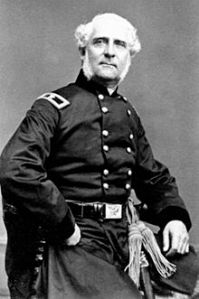As I have oft written, Abner Doubleday is a Civil War character of particular interest to me. It was about this time of January 150 years ago that Doubleday was reassigned within the 1st Corps of the Army of the Potomac.
Just prior to the Battle of Antietam, Doubleday had moved from brigade command to the divisional command of the 1st Division of the 1st Corps. He and his troops were mostly idle on the left flank of the Army at Fredericksburg.
The 3rd Division of the 1st Corps – Meade’s division of Pennsylvania Reserves – was withdrawn (after Fredericksburg) to Washington to rest and recruit. These troops were seriously depleted from the Peninsula and the Maryland Campaigns.
Doubleday was removed from the 1st Division to construct a new 3rd Division of the Corps, with General Wadsworth moved into his former position. This occasioned some remarks by those writers I often quote: George F. Noyes (of Doubleday’s staff) and A.P. Smith of the 76th New York.
Noyes wrote: During these days, by one of those changes resulting from priority of rank, our division received a new commander, while our former general was transferred to the command of another division in the same corps. Of course the withdrawal of the latter created a profound sensation among officers and men. It was natural that the troops who had followed him through so many scenes of difficulty and danger, who had learned to love, and, what is far more important, to trust in him, and who had become proud of their leader, should experience deep regret at the parting, while those of us who had entered into military life as members of his staff felt like men who are parting with their best friend. As only his aides are attached to the person of a general, most of the staff still remained at division headquarters. With our new general, late military governor of Washington, whom we had long known by reputation, we were soon quite at home; and as such a man usually surrounds himself with gentlemen, we found his personal aides very pleasant companions in camp, and everything soon fell into the usual comfortable routine at our headquarters.
A.P. Smith wrote: While stationed at this point, our Division was pained at losing their brave commander. By priority of rank, General Doubleday was transferred to another division of the same Corps, and General Wadsworth given the command of our Division.
The men were familiar with the principles of General Wadsworth, and approved them; but their first experiences in battle were under and with General Doubleday, and they parted with him with regret. General Doubleday was one of those true men who went to the war from principle. With comprehensive views of the questions involved, and the causes of the war, and a clear conception of the character of the rebel leaders, and the personal motives which actuated them, he believed what everyone now realizes, that the kid-glove style of treating them would never accomplish anything for the Union. With him, compromise was disloyalty and death to the Government. General Doubleday had fired the first gun from Sumter, and there learned lessons which were never forgotten. Men of different political views, and looking at this war from a different standpoint—men who could walk the streets at night in deep study whether to espouse the cause of the Union or the Confederacy, and the next day, on the receipt of a commission or important command, “Mouth it” for the Union equally with the most ranting politician, looked upon General Doubleday as an impolitic radical, and threw every possible obstacle in his way. But the officers and men who had witnessed his noble daring at Rappahannock, Gainesville, Bull Run, South Mountain, Antietam and Fredericksburg, and were most intimately acquainted with him, knew but to love him.
On taking leave of the Division, the General issued the following brief address:
“In taking leave of this command, I desire to say one word of farewell. Wherever the service may call me, and whatever may be my future lot, I shall never forget the ties which bind me to this Brigade and this Division. I shall never cease to remember the brave men who stood by my side in some of the most stupendous battles the world ever saw. Men who fought against such heavy odds at Gainesville and the first day at Bull Run—who stormed the heights at South Mountain, took eight standards from the enemy at Antietam, and held their ground so bravely at Fredericksburg, have won my admiration and regard. I am happy to have fought by their side, and proud of the honor of having commanded them. I wish them now at parting, individually and collectively, all honor and success.”
It was natural that the men who had followed him through the terrible marches and scenes of difficulty and danger, on the retreat saved by his skill, and by the same skill and courage, led by him to victory, and who had become proud of their leader, should experience deep regret at parting.



Wadsworth too must have gone to war for principle. It would be interesting for someone to describe in detail what priority of rank means and how it affected the army and the shifting of commanders.
Wadsworth, Doubleday, and these two writers are all New Yorkers who were at the least sympathetic to the abolitionist position. Regarding priority of rank, it was the non military writers using this phrase here. And though this was most often followed, it sometimes got trumped – which happened to Doubleday after Gettysburg when Newton was given Corps command over Doubleday who had rank. This totally offended Doubleday – who spoke of it as “not following the organic nature of promotions.”